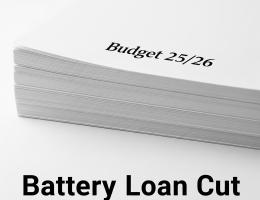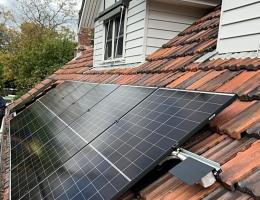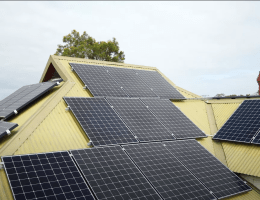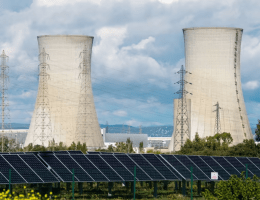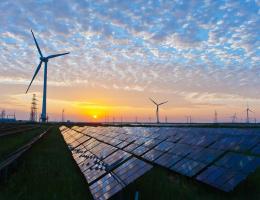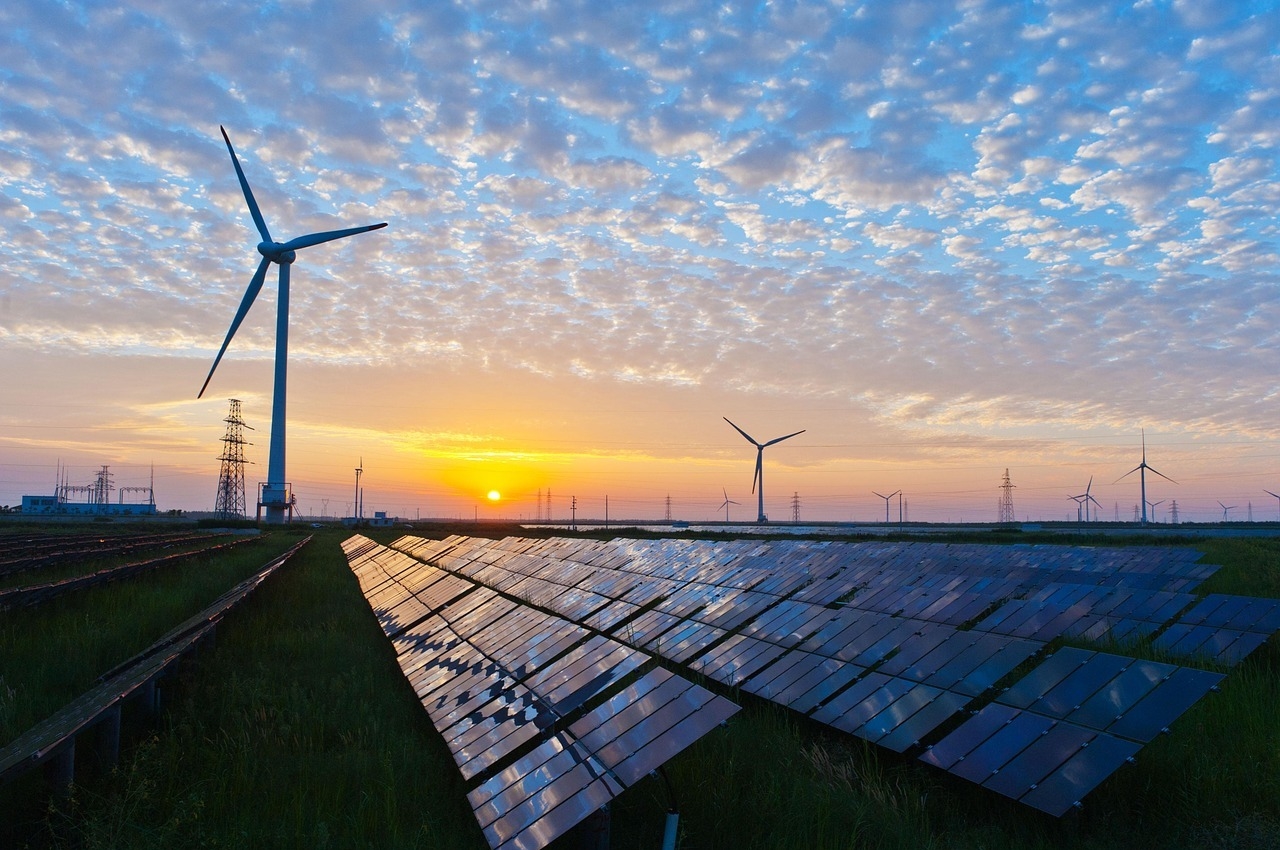
In an engaging discussion on Disrupt Radio's "Moolah Mornings," host Omar de Silva sits down with Matthew Wright, CEO of Pure Electric, to dive deep into the challenges and opportunities within the renewable energy sector. The following transcript captures their discussion on the evolving dynamics of government policies, technological advances, and economic impacts that shape this critical industry.
Omar de Silva 0:06
One sector which is unquestionably influenced and driven and sometimes held back by the government is renewable energy. And it's obviously a space that in my opinion, we need to be doing more in at a faster rate and someone that is doing exactly that is my next guest, Matthew Wright, the CEO of Pure Electric, Matthew, thanks for joining me.
Matthew Wright 0:27
Thanks for having me.
Omar de Silva 0:28
So Matthew, give us a rundown tell us a little bit about Pure Electric when you got started. And what it is that you found yourselves focusing on these days.
Matthew Wright 0:35
I started out as a climate and energy campaigner all the way back in around 2001. And set up some organizations worked with Melbourne Uni and released the Zero Carbon Australia projects, So it was one of the first plans in the world to transition an economy to 100% renewable energy, but the activist space doesn't pay well. So in 2014
Omar de Silva 0:55
Funnily enough.
Matthew Wright 0:55
I set up a commercial business concern, which is called Pure Electric, and we basically electrify houses. So the aim was to get houses off gas make them Pure Electric, taking advantage of renewable energy, efficient heat pump heating, so instead of gas heating, which was common in the southern states, and now battery storage, and electric vehicle charging, so sort of the whole gamut of what's required to get a house. So the new model of being a renewable energy powered house that just exports excess energy and can even reduce imports of energy is close to zero.
Omar de Silva 1:27
Congratulations on 10 years. I mean, that's a massive milestone for any business. I'm curious to know, 10 years ago, what was the mood like and the support like for a business like yours, as compared to now has there been a big shift.
Matthew Wright 1:41
It's always a moving space, the government support is is lessened. But that's almost acceptable to some extent, and by design. And that's because the cost of renewable energy technology just keeps going down, down, down. So 10 years ago, a solar panel per watt would have cost, let's say just one unit to measure it in, it would have cost like $2.50, wholesale, and now it costs like 19 cents.
Omar de Silva 2:08
Right? So what's that? It's less than a tenth.
Matthew Wright 2:10
Yeah, that's right. That's right, less than a tenth, then the trend is for that to drop to in Aussie dollars to about 14 cents, or 10 cents US, which is really cheap. I mean, how cheap can you get a two square metre piece of glass with aluminium on it and some silicon cells and electrical connections sandwiched between them. And there's, they're going down to 100 bucks, you know, for for a panel wholesale so they're, they're cheap.
Omar de Silva 2:29
So Matthew, maybe you can help me understand this. There's a lot of conversation out there in media and in governments, and in certain interest groups, that the transition to renewable energy isn't as straightforward as some would make it out to be. And actually, if you turn off coal fired power plants, then prices are going to go up. And it's because we haven't been doing enough in recent years that we've seen the energy price increase that we have, particularly in 2024 and second half of 2023. Why is it that we are seeing such an increase or decrease in the cost of renewables yet an increase in the cost of energy? Where am I missing something?
Matthew Wright 3:07
So lack of vision and political uncertainty is what's caused that to occur if we'd actually gone full steam ahead without the steam, just the photons and, electricity, Full electrons ahead, yes, into renewable energy grid. And we haven't had various political interference and one upmanship between a very polarized kind of political atmosphere, then we will be well down the track. And I think, worst case would have the same price of power now, but we'd actually have a renewable energy grid, or at least a predominantly renewable energy grid. So when we did the Zero Carbon Australia stationary energy plan, version one, back in 2010, when we were writing that with Melbourne University Energy Institute, we released that it was a much more difficult task than if you map out the task from today. So our starting point was less than 10% renewables, we're now at about 38%, renewables on the electricity grid,
Omar de Silva 3:58
Okay, so there's 38% of the electricity grid at the moment is filled with renewables.
Matthew Wright 4:03
So 31% is new renewables like wind and solar. And back in the day talking about the uncertainty in terms of the public discourse about the lights are gonna go out or we need coal fired power plants, well, back then they said if we get 5% renewables, the lights are going to go out the grid can't stand 5% variable renewables we know that to complete another lie it was then it is now and, the new version of that lie is to say that the same sort of thing is going to happen if we continue to increase renewables. We heard it back then when we had less than 5%, that 5% would cripple us, and it didn't, and it won't cripple us now so we can keep building renewables and there's actually a lot of capacity on the grid. And we can use a lot of modern smarts to mean we can minimize the the spend to integrate it we can we can take advantage of existing like Transformers in the sub networks to be able to have high penetrations of solar easily double what we have now without doing anything like that the capacity is there, the grid spends most of its time idle, just like your car spends 90% of its time on a 5% It's time parked, so does the grid, the grid has been built for an extreme peak day. And everyone imagine it was like King's birthday weekend. And everybody wants to drive and exit the city at 100 kilometers per hour. That's how the grid is built. But if we said to people, some people, defer your holiday a week, and we'll pay you or we charge more for the people who use the grid on King's birthday weekend, we can, we can actually knock a couple lines off that 50 lane highway to get everyone out of the city. And we can, so we don't need to be able to service everyone for one peak a year to go 100km/h. And that's how the grids been built. And that's self serving for the grid operators because they're pretty greedy, greedy guys, they don't really want to promote a pricing mechanism that prices the grid properly. They want it to be just a shamozzle and a mess they want unbridled increases in in consumption without any pricing or any education of the public because for them taking some excuse to build more assets that are regulated monopoly, they need an excuse to build more assets and spend our money. We can stop that now with a bit of foresight, we know that for instance, with solar integration Ausgrid in New South Wales, they service from Wollongong up to Newcastle, including Sydney, their biggest richest distributor, network distributor, owners of poles and wires in the country, they are putting in a solar tax that they want to implement on July 1. Now I'm trying to spearhead spearhead a campaign to to recind that or at least delay that, that solar tax, they want to appropriate half up to half of what people get paid for exports into the grid. Now, when they proposed it, well, more than a decade ago, ACOSS and other social service members got in behind it because they thought oh yeah it is 10% of what people are getting paid for their feed-ins. So they can make that contribution. But actually now it's half the value of what we export to the grid Ausgrid wants to appropriate of our money.
Omar de Silva 6:43
Plenty there. Matthew Joining me is Matthew Wright is a CEO of pure electric clearly a passionate man when it comes to renewable energies. So stick around and continue to chat after this and understand what more that we can be doing to accelerate our transition to renewables because we need to do it. But there are plenty of challenges in the way that we need to overcome. And I want to figure out how don't go anywhere. I'm speaking with Matthew Wright, he's the CEO of pure electric don't go anywhere, I want to learn more about how we can practically tackle some of the challenges of getting to a renewable energies more quickly, don't go anywhere.
Omar de Silva 7:36
I'm speaking with Matthew Wright, CEO of Pure Electric and back in 2010, he was also the Young Environmentalist of the Year, he's been working on plans for decades to help get Australia to Zero Carbon. Matthew, you've touched on some of these areas, I want to go further because I really want to understand it. I believe we need to get to 100% renewables as quickly as we possibly can. There are people that know more about it than I do that say we can't make that transition or that switch in a matter of months or in a matter of one or two years. It requires longer. You said earlier that if we had had the foresight decades ago, then by now we could have probably already been there with the same price of energy. But intrinsic in that is that we didn't so based on where we are now. If everybody got around it, how quickly can we make that transition without the general public being worse off,
Matthew Wright 8:27
I started this with my PhD Scholarship back in 2016. Looking at like a 10 year plan, which is an immediate enough timeframe, it could be done kind of like COVID emergency measures. If we went for that we could do it in five or six. Okay. Um, 10 is probably a bit more orderly, we could do it in 10 years. The great news is that it's much easier to do today than it was a decade ago or 15 years ago, because the renewable energy technology is actually being installed at scale around the world. And the prices are really down. We're at a point where solar PV once it hits 10 cents US a watt and battery storage, chemical storage. So basically, mostly lithium ion batteries is on its way seriously down, there's a bit of a lag time. So you can't buy (cheap) electric cars yet. It's sort of $10,000 dearer than ICE cars still, but they're getting really close and stationary storage. So storage at your house, for example. But you will be able to soon we're talking like within three years for sure. At $20 a kilowatt hour, which is the price would have to be in China at the gate, the storage for lithium ion plus renewables is cheaper than anything else. Cheaper than gas, cheaper than coal and definitely cheaper than nuclear. Nuclear; the problem with that is the projects so big and they blow out and they take 20 years, so you can't really compare nuclear to renewables. The great thing about renewables, many small projects, or even the large projects are small by, they're modular, you commence a project, you break ground, and the projects are finished in one month, or they're finished in six months or the longest wind projects have finished in like a year and a half. That's it done and they're online and they're operating so they're ready for revenue generation really fast. So in my sector, I'm in the smaller domestic space. We get a customer that comes in, they say I want to buy solar, we price them up in a week or two based on whether it needs site inspections, or we get photos and things like that. And then we schedule from two to four weeks for an install. And then we're just lodging some paperwork with the network operator to get them paid their feed-in and make it all official end to end, it doesn't take longer than two months. Now, you just can't compare that when you mobilise the capital, we mobilise that private money, and then you execute, and then you've got power getting generated in two months versus the other end of the extreme would be building a nuclear plant, which means building a nuclear industry, and it'd be 20 years. So some people try to put a stick through the spokes of our bike right now our electric bike and push us over by causing us to have a stack by proposing the idea of nuclear power. But there's just no start with nuclear in Australia, if we went gung ho towards nuclear would take us 20 years to make some electricity. By that stage, renewables is well cheaper than everything you can buy, including nuclear, that it is already cheaper than now.
Omar de Silva 11:13
Gotcha. Okay. So that's, I mean, that's a good explanation as to why nuclear doesn't stand up. And I'm going to really simplify it here. But if we just look at a time horizon, nuclear is going to take a heck of a lot longer to get there. So forget about where it might actually get us to, it's going to be much longer than than other options. With that being the case. Why is it that the government is so insistent on not doing what it would take to achieve that 10 year plan that you've described to us.
Matthew Wright 11:40
Because old incumbents and old money that's tied up in assets that have already paid themselves up is going to always mobilize and spend its money rather than spending money on research and development and creating something new, they spend their money on protecting themselves. So they're, they've got political carriage, they've got power, they've got access to some media, and they've got propagandists, and so on. And that's what they pay for to maintain their business. Whereas someone in the renewable energy industry and people in that sphere, they spend the money on research and development to make the next cheaper product to make the next more innovative product. And that's how they gain their market share. So they're the two opposing forces. And of course, the the incumbents protecting themselves is just useless, you know, like, that's just money being spent to allow them to keep forestalling the inevitable better state that we can move society to that we can move the world to that we can have a safe climate. So sadly, they' re the dynamics. And obviously, the starting point is all the money is in the incumbent revenue streams for those really big power and fossil fuel industries and car industry, car industry plus fossil fuel industry, which includes the automotive fuels, and the stationary energy being your coal power plants, gas power plants, I mean that that's the biggest money in the world. And what we're doing is saying, We're gonna move that to electric vehicles that have got batteries, and we're going to power that by renewables, we're basically looking at a wholesale change, and all the pieces for the wholesale change are there right now. So it's just two economies now running side by side, one's a sunset economy, the sun needs to go down fast. And the other one is the sunrise economy, it's emerging. And the price is already on par in some parts of it and about to be on par within a few years. And that includes electric vehicles. That includes the battery storage, the solar prices, pretty much already there, the wind price is already there.
Omar de Silva 13:21
And so is the contention in that then Matthew, that the incumbents, they have got the ear of the government, they've got far more influence. And there's far more at stake for the government to go against that sunset economy in favour of the sunrise is that why the government's won't act?
Matthew Wright 13:36
Well, they've set themselves up years ago. And they're kind of paranoid. So they actually invested more money than they needed to in early days when, when renewable energy was really nice. And they were, like, so smart, if you look at it from their perspective, because they were quite paranoid. And so they really create, they created, a lot of discourse, and a lot of, put a lot of energy into disrupting any moves towards renewable energy. And I did it early in the piece. So in a country that doesn't have a fossil fuel sector, these conversations are really easy, like New Zealand or something, they just accept climate change, and they except for going to renewable, they're already, they're already 90%, renewable something in New Zealand, and electric vehicles, they're very open to electric vehicles in New Zealand, because they've already got that renewable energy grid, they see that they're importing fuel, and they're paying a lot for that. But Australia although it imports a lot of fuel, it also exports a lot of fossil fuels. So therefore, it sort of seems to be this psyche of worry about decoupling from fossil fuels. And the industry is really created that through their multifaceted, effective propaganda and marketing campaign. And I think the good news is that renewables are so cheap that it's just too blatantly obvious. So it's getting harder and harder for them to maintain that status quo and to keep protecting themselves. I think they're definitely open now. But but just remember that if you've got a coal power plant, that's an old piece of junk, and you can keep it going another day or another year, like they make a lot of money every day. Yeah. So you just want to keep it going that extra day or two days or 10 days or two years. And so they will fight tooth and nail To keep it going, because it's pretty cheap to pay some people to try and create the political atmosphere, create the social licence to stay open a bit longer. It's really cheap because they're earning billions of dollars.
Omar de Silva 15:10
So Matthew, we've only got 20 seconds left. So it's a it's a line or two. What would you like to see happen next to get to kickstart this this 10 or less year plan to renewables, what's the most important thing we could do?
Matthew Wright 15:23
No solar tax, that's the exports. We need a planning body and an execution body and we need funding for 100% renewable transition we need a clear goal that it is 100% renewable energy transition, no ifs, no buts about it, we need to basically focus on the real renewables, which is wind power, large scale wind turbines, in farms, and so on. And solar panels and solar panels on domestic rooftops on small business rooftops on medium and large commercial and utility scale. And finally, battery storage, the stuffs available if we want we could have industrial policy and do it here. But if we're going to do it, don't do it half heartedly, we need to invest billions and that's what China has done, it has invested huge money to get where they are. And if you pick it up from here on, you do take advantage that we were the leaders in r&d UNSW University New South Wales is the leader in that research. So we can commercialize here if we want to, but we don't have to, we can buy the stuff off the shelf. Because we are (for example) obviously buying mining equipment, we don't make it ane we mine; same deal we can buy in renewable energy
Omar de Silva 16:19
Matt, your passion is is infectious. Clearly, Matthew Wright, he knows all about what needs to happen. You can check out more of his work at https://pure-electric.com.au. From my perspective, I'm all in favour of us getting to this renewable transition as quickly as we possibly can. And it sounds like there's some really practical steps that we need to support and accelerate. It brings the show to an end. And sort of the whole reflection for me throughout these conversations is just how much influence is the right amount for government? I mean, on one equation, we've said we've heard that the government's need to be able to have more influence around big tech and what they can and can't do. But on the other side of the equation, we've got governments supporting big energy preventing us from where we need to get to so it's never a straightforward conversation. And when that's the case, more conversation needs to be had not less and I look forward to doing exactly that. Thanks for joining me there'll be plenty more tomorrow. This is Moolah on disrupt radio
